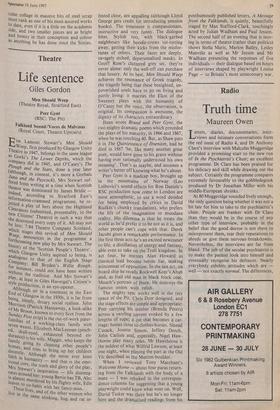Theatre
Life sentence
Giles Gordon
Men Should Weep (Theatre Royal, Stratford East) Peer Gynt (RSC: The Pit) Falkland Sound/Voces de Malvinas (Royal Court, Theatre Upstairs)
Ena Lamont Stewart's Men Should Weep, first produced by Glasgow Unity Theatre in 1947, belongs in the same league as Gorki's The Lower Depths, which the company did in 1945, and O'Casey's The Plough and the Stars, done a year later (although, in content, it's more a Gorbals Juno and the Paycock). Mrs Stewart suf- fered from writing at a time when Scottish theatre was dominated by James Bridle indeed, according to Stratford East's information-crammed programme,he re- jected a play of hers about the Highland Clearances (submitted, presumably, to the new Citizens' Theatre) in such a way that she destroyed every copy of it. All may not be lost: 7:84 Theatre Company Scotland, which stages this revival of Men Should Weep, announces in the programme a forthcoming new play by Mrs Stewart. The history of the 'Scottish People's Theatre', which Glasgow Unity aspired to being, is analogous to that of the English Stage Company: Bill Bryden's Willie Rough, instance, nstance, could not have been written without the tradition. And Mrs Stewart's Play, at least in Giles Havergal's Citizen's- style production, is an eye-opener. Although set in a tenement in the East End of Glasgow in the 1930s, it is far from being, simply, dreary social realism. John Morrison (Patrick Hannaway, a look-alike of Mr Broon, known to every Scot from the Sunday Post strip) is the out-of-work pater- familias of a working-class family with seven weans. Elizabeth MacLennan (pinch-
ed, skull-eyed, exhausted beyond en- durance) is his wife, Maggie, who keeps the
family going by cleaning other people's homes, and tries to bring up her children decently. Although she never ever loses
faith in humanity — and that is the emo- tional core, the truth and glory of the play, Mrs Stewart's inspiration — life disinteg-
rates around her: young Bertie has TB, Alec is almost murdered by his flighty wife, Edie leaves to co-habit with her fancy-man.
These lives, and of the other women who i
live in the same stinking, bug and rat in-
fested close, are appalling (although Lloyd George gets credit for introducing pension books). The treatment is compassionate, instructive and very funny. The dialogue bites. Stylish too, with black-garbed neighbours like hoodie-crows tut-tutting away, getting their kicks from the misfor- tunes of others. Their faces are deeply, savagely etched, depersonalised masks. In Geoff Rose's cluttered grey set, they're never alone: only the well-off can purchase
that luxury. At its best, Men Should Weep achieves the resonance of Greek tragedy, the tragedy being that these benighted, im-
poverished souls have to go on living and partly living: it marries the Eliot of the Sweeney plays with the humanity of O'Casey but the voice, the observation, is original. Its compassion is awesome, the dignity of its characters extraordinary.
Ibsen wrote Brand and Peer Gynt, the two mighty dramatic poems which preceded
the plays of his maturity, in 1866 and 1867,
when he was touching 40. But, as Shaw puts it in The Quintessence of Ibsenism, had he
died in 1867 'he, like many another great poet, would have gone to his grave without having ever rationally understood his own meaning'. That's as maybe, and assumes a writer's better off knowing what he's about.
Peer Gynt is a madcap boy, brought up in the mountains of Norway (Leo Leibovici's sound effects for Ron Daniels's RSC production now come to London are most atmospheric, to use a word derided for being employed by critics in David Rudkin's chunky translation), who prefers the life of the imagination to mundane reality. His dilemma is that he treats the world as he'd prefer it to be not as it is, and other people can't cope with that. Derek Jacobi gives a remarkable performance. In the first three acts he's an excited newcomer to life, a distillation of energy and fantasy, able even to take on the Troll kingdom. In act four, he mirrors Alan Howard as classical lead become heroic liar, making mincemeat of opposition. In the last act, on board ship he recalls Rockwell Kent's Ahab and, as frail old man in black frock coat, Munch's portrait of Ibsen. He destroys the famous onion with relish.
The mighty epic works well in the tiny space of the Pit. Chris Dyer designed, and the stage effects are simple and appropriate: Peer carrying his mother (Brenda Peters) across a swirling torrent evoked by a few lengths of rope; a cot that becomes a car- riage; horses close to clothes-horses. Sinead Cusack, Josette Simon, Jeffery Dench, John Carlisle and, especially, Nigel Haw- thorne play many roles. Mr Hawthorne is the mildest of what Wilfrid Lawson, at least one night, when playing the part at the Old Vic described as the Mutton-boulder.
When I reviewed Tony Marchant's Welcome Home — about four paras return- ing from the Falklands with the body of a mate — I was rebuked in the correspon- dence columns for suggesting that a young playwright could know what went on. Well, David Tinker was there but he's no longer here and the dramatised readings from his posthumously published letters, A Message from the Falklands, is quietly, beautifully staged by Max Stafford-Clark, touchingly acted by Julian Wadham and Paul Jesson. The second half of an evening that is mov- ing in terms of theatre (rather than politics) shows Stella Maris, Marion Bailey, Lesley Manville as well as Mr Jesson and Mr Wadham presenting the responses of five individuals — their dialogue based on hours of interviews shaped by playwright Louise Page — to Britain's most unnecessary war.






































 Previous page
Previous page